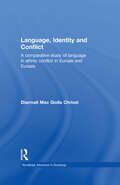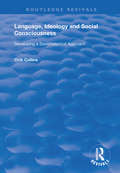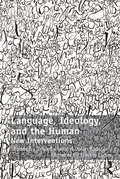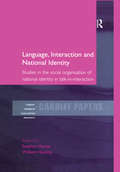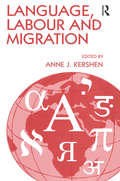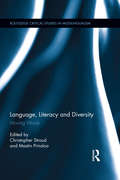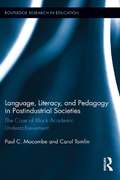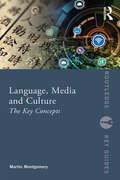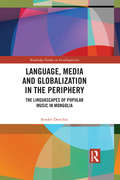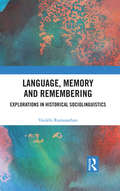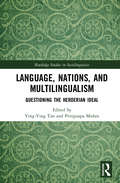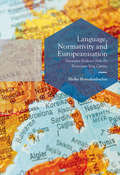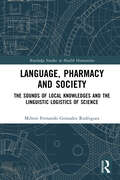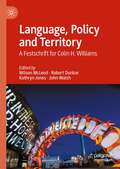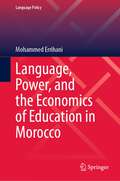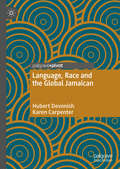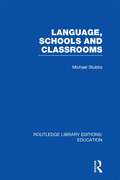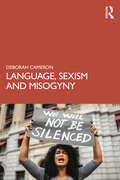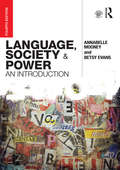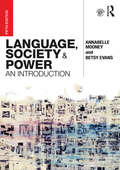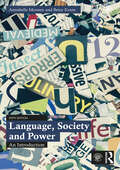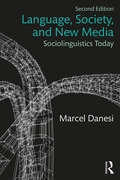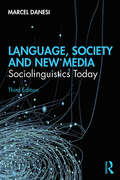- Table View
- List View
Language, Identity and Conflict: A Comparative Study of Language in Ethnic Conflict in Europe and Eurasia (Routledge Advances in Sociology)
by Diarmait Mac Giolla ChríostThis innovative study of language and identity in recent and contemporary cases of ethnic conflict in Europe and Eurasia sets out a response to the limitations in the fields of linguistics and political science. Using examples of language policy and planning in conflict situations, it examines the functions of language as a marker of identity in ethnic conflict, and the extent to which language may be a causal factor in ethnic conflict.
Language, Ideology and Social Consciousness: Developing a Sociohistorical Approach (Routledge Revivals)
by Chik CollinsOriginally published in 1999, this book sets out to develop a distinctive, critical approach to the study of social consciousness through empirical studies of sociopolitical conflict in the west of Scotland. It accords an analytical priority to language-use and provides a critical review of a number of contemporary studies and approaches as part of an emerging presentation of an original and distinctive method. The book makes a significant contribution to the recovery for social science of the achievements of a set of Marxist psychologists and philosophers of language - most notably L.S. Vygotsky and V.N. Voloshinov - whose potential relevance for political sociology has barely been recognised. It tests and demonstrates the relevance of the approach it seeks to develop in relation to empirical studies - most notably the Upper Clyde Shipbuilders 'work-in' of 1971-72 and the Scottish Office-led urban policy 'Partnership' in Ferguslie Park, Paisley in the late 1980s and early 1990s. Ultimately, the analytical focus on language becomes a key component of a larger mode of social investigation which begins from an analysis of changing patterns of language-use - one which 'turns' to language without embracing the 'linguistic turn'.
Language, Ideology, and the Human: New Interventions
by Sanja Bahun Dušan RadunovićLanguage, Ideology, and the Human: New Interventions redefines the critical picture of language as a system of signs and ideological tropes inextricably linked to human existence. Offering reflections on the status, discursive possibilities, and political, ideological and practical uses of oral or written word in both contemporary society and the work of previous thinkers, this book traverses South African courts, British clinics, language schools in East Timor, prison cells, cinemas, literary criticism textbooks and philosophical treatises in order to forge a new, diversified perspective on language, ideology, and what it means to be human. This truly international and interdisciplinary collection explores the implications that language, always materialising in the form of a historically and ideologically identifiable discourse, as well as the concept of ideology itself, have for the construction, definition and ways of speaking about 'the human'. Thematically arranged and drawing together the latest research from experts around the world, Language, Ideology, and the Human offers a view of language, ideology and the human subject that eschews simplifications and binary definitions. With contributions from across the social sciences and humanities, this book will appeal to scholars from a range of disciplines, including sociology, cultural studies, anthropology, law, linguistics, literary studies, philosophy and political science.
Language, Interaction and National Identity: Studies in the Social Organisation of National Identity in Talk-in-Interaction (Cardiff Papers in Qualitative Research)
by William Housley Stephen HesterContemporary political and public discourse has come alive with the issues and conflicts surrounding questions of national identity. Despite the widespread sociological attention it has drawn as a result, most studies of national identity have been conducted at considerable analytical distance from the lived reality of national identity talk. This collection brings together the work of contemporary researchers, situating the talk and interaction in which national identities are actually expressed and used. The book presents detailed investigations of how persons actually use national identity in their talk, the interactional uses to which such expressions are put, and the interactional consequences of such identity talk. The studies are based on transcribed tape recordings of naturally occurring talk across a variety of different countries and settings, illuminating not only situated national identity talk as a phenomenon in its own right, but also providing empirically grounded research for traditional sociological theorising about issues of integration, devolution and exclusion.
Language, Labour and Migration (Studies in Migration and Diaspora)
by Anne J. KershenLanguage, Labour and Migration explores two fundamental aspects of the migrant experience through a multi-disciplinary lens which combines the research of leading academics at the cutting edge of their fields. This latest volume from the centre for the Study of Migration brings together the work of anthropologists, economists, geographers, historians, political scientists and medical practitioners. Essays explore topics which include the role of mother tongue as a bridge to assimilation, the racialization of immigrants and refugees through language, the patterns of resistance undertaken by lascars, the experience of black British seamen in the eighteenth century, health advocacy in the twentieth century and the way in which cyber-space is being used to rediscover ethnic identity in the twenty-first century. Other essays examine Chinese labour in France during the First world war, employment opportunities for those deficient in the majority language and poverty in old age. All provide new and at times controversial, insights into the problems of language and labour in an alien society.
Language, Literacy and Diversity: Moving Words (Routledge Critical Studies in Multilingualism)
by Mastin Prinsloo Christopher StroudLanguage, Literacy and Diversity brings together researchers who are leading the innovative and important re-theorization of language and literacy in relation to social mobility, multilingualism and globalization. The volume examines local and global flows of people, language and literacy in relation to social practice; the role (and nature) of boundary maintenance or disruption in global, transnational and translocal contexts; and the lived experiences of individuals on the front lines of global, transnational and translocal processes. The contributors pay attention to the dynamics of multilingualism in located settings and the social and personal management of multilingualism in socially stratified and ethnically plural social settings. Together, they offer ground-breaking research on language practices and documentary practices as regards to access, selection, social mobility and gate-keeping processes in a range of settings across several continents: Africa, Asia, the Americas and Europe.
Language, Literacy, and Pedagogy in Postindustrial Societies: The Case of Black Academic Underachievement (Routledge Research in Education #91)
by Paul C. Mocombe Carol TomlinIn postindustrial economies such as the United States and Great Britain, the black/white achievement gap is perpetuated by an emphasis on language and language skills, with which black American and black British-Caribbean youths often struggle. This work analyzes the nature of educational pedagogy in the contemporary capitalist world-system under American hegemony. Mocombe and Tomlin interpret the role of education as an institutional or ideological apparatus for capitalist domination, and examine the sociolinguistic means or pedagogies by which global and local social actors are educated within the capitalist world-system to serve the needs of capital; i.e., capital accumulation. Two specific case studies, one in the United States and one in the United Kingdom, are utilized to demonstrate how contemporary educational emphasis on language and literacy parallels the organization of work and contributes to the debate on academic underachievement of black students vis-a-vis their white and Asian counterparts.
Language, Media and Culture: The Key Concepts (Routledge Key Guides)
by Martin MontgomeryLanguage, Media and Culture: The Key Concepts is an authoritative and indispensable guide to the essential terminology of the overlapping fields of Language, Media and Culture. Designed to give students and researchers ‘tools for thinking with’ in addressing major issues of communicative change in the 21st century, the book covers over 500 concepts as well as containing an extensive bibliography to aid further study. Subjects covered include: Authenticity Truthiness Structures of feeling Turn-taking Transitivity Validity claims With cross referencing and further reading provided throughout, this book provides an inclusive map of the discipline, and is an essential reference work for students in communication, media, journalism and cultural studies, as well as for students of language and linguistics.
Language, Media and Globalization in the Periphery: The Linguascapes of Popular Music in Mongolia (Routledge Studies in Sociolinguistics)
by Sender DovchinThe title seeks to show how people are embedded culturally, socially and linguistically in a certain peripheral geographical location, yet are also able to roam widely in their use and takeup of a variety of linguistic and cultural resources. Drawing on data examples obtained from ethnographic fieldwork trips in Mongolia, a country located geographically, politically and economically on the Asian periphery, this book presents an example of how peripheral contexts should be seen as crucial sites for understanding the current sociolinguistics of globalization. Dovchin brings together several themes of wide contemporary interest, including sociolinguistic diversity in the context of popular culture and media in a globalized world (with a particular focus on popular music), and transnational flows of linguistic and cultural resources, to argue that the role of English and other languages in the local language practices of young musicians in Mongolia should be understood as "linguascapes." This notion of linguascapes adds new levels of analysis to common approaches to sociolinguistics of globalization, offering researchers new complex perspectives of linguistic diversity in the increasingly globalized world.
Language, Memory and Remembering: Explorations in Historical Sociolinguistics
by Vaidehi RamanathanThis volume explores issues of memory, remembering and language in late colonial India. It is the first systematic historical sociolinguistic study of English private and public citizens who lived in and/or worked for India and the Indian cause from the 1920s to the 1940s. While some of the English have lived as common citizens and were committed to India, their voices and contributions have remained on the margins of Indian collective memory. This book offers microhistorical readings of extended language forms generally underexplored in sociolinguistics (such as letters, telegrams, missives, and oral histories) to reorient facets of individual memories, lives, and endeavours against larger officialised understandings of the past. Using previously unpublished corpus of archival material and interviews with English private citizens from that period, this volume on historical sociolinguistics will be of interest to scholars and researchers of language and linguistics, South Asian studies, post-colonial literary studies, culture studies, and modern history.
Language, Migration, and Identity
by Zane GoebelWhile much scholarship has been devoted to the interplay between language, identity and social relationships, we know less about how this plays out interactionally in diverse transient settings. Based on research in Indonesia, this book examines how talk plays an important role in mediating social relations in two urban spaces where linguistic and cultural diversity is the norm and where distinctions between newcomers and old timers changes regularly. How do people who do not share expectations about how they should behave build new expectations through participating in conversation? Starting from a view of language-society dynamics as enregisterment, Zane Goebel uses interactional sociolinguistics and the ethnography of communication to explore how language is used in this contact setting to build and present identities, expectations and social relations. It will be welcomed by researchers and students working in the fields of linguistic anthropology, sociolinguistics, the anthropology of migration and Asian studies.
Language, Nations, and Multilingualism: Questioning the Herderian Ideal (Routledge Studies in Sociolinguistics)
by Pritipuspa Mishra Ying-Ying TanLanguage, Nations, and Multilingualism explores the legacy of Herder’s ideas about the relationship between language and nationalism in the post-colonial world. Focusing on how anti-colonial and post-colonial nations reconcile their myriad multilingualisms with the Herderian model of one language-one nation, it shows how Herder’s model is both attractive and problematic for such nations. Why then does the Herderian model have such valency? How has the Herderian ideal of one nation-one language continued to survive beneath the uncomfortable resolution struck by new multilingual nations as they create fictions of a singular national mother tongue? To what extent is Herder still relevant in our contemporary world? How have different nations negotiated the Herderian ideal in different ways? What does the way in which multilingual post-colonial nations deal with this crisis tell us about a possible alternative framework for understanding the relationship between language and nation? By approaching this investigation from diverse archives across Asia, Africa, Europe, Latin America, and the Caribbean, Language, Nations, and Multilingualism proposes answers to the aforementioned questions from a global perspective that takes into account the specificities of a range of colonial experiences and political regimes. And by extending the discussion backwards in time to offer a more historical reading of the making of modern nations, it allows us to see how multilingualism has always disrupted constructions of monoglot nations.
Language, Normativity and Europeanisation
by Heiko MotschenbacherThis book focuses on linguistic practices of identity construction in a popular culture media context, the Eurovision Song Contest. Subscribing to a normativity-based approach to critical discourse analysis, it studies Europeanisation as it surfaces at the discursive interface of European, national and sexual identities in Eurovision lyrics and performances. Research in critical discourse analysis that deals with Europeanisation, or the discursive work involved in European identity formation, has so far mainly studied data from EU political contexts that illustrate a top-down approach to what Europeanness means. The present book complements this earlier research in several ways, focusing on the linguistic construction of identities, and its interrelation with non-linguistic modes of signification in the Eurovision Song Contest. Discursive mechanisms that prove to be central for the normative shifts of Europeanisation in the given context are de-essentialisation, inclusion, camp, crossing and languaging.
Language, Pharmacy and Society: The Sounds of Local Knowledges and the Linguistic Logistics of Science (Routledge Studies in Health Humanities)
by Milton Fernando RodriguezThis book explores the vital role language plays in shaping how we understand and discuss medicines, making for a more detailed study of pharmaceutical and pharmacological language to more clearly understand the intersection of language, health, and culture.Gonzalez Rodriguez charts the development of the language of pharmacy from the mid-19th century onward, drawing on data from Icelandic and Spanish natural language corpora, historical sources, and contemporary data. The book brings together scholarship from sociolinguistics, media, and cultural studies, and the history of science to highlight the possibilities afforded by an interdisciplinary approach to pharmacy-related language.The book will benefit readers by providing a deeper understanding of the intersection between language, science, and culture, making it especially valuable for students and scholars in sociolinguistics, history of science, medical humanities, and cultural studies.
Language, Policy and Territory: A Festschrift for Colin H. Williams
by John Walsh Kathryn Jones Wilson McLeod Robert DunbarThis volume celebrates the contribution of Professor Colin Williams, an immensely important and influential scholar in the field of language policy for more than forty years. Eighteen chapters by former students, colleagues and collaborators address a range of topics involving different aspects of language legislation and language rights, governance, economics, territoriality, land use planning, and onomastics. Six chapters address policy issues in Professor Williams’s native Wales while others focus on Canada, Catalonia, Ireland and Scotland. The volume concludes with an Afterword by Professor Williams himself. The book will be suitable for postgraduates and researchers not only in the field of language policy and planning but also sociolinguistics, geography, law and political science.
Language, Power, and the Economics of Education in Morocco (Language Policy #35)
by Mohammed ErrihaniThis volume provides a comprehensive understanding and assessment of language policy in education in Morocco. All aspects related to language policy and the effect on the education sector for more than half a century in Morocco are included in the book. The book traces the role that the linguistic medium has played in the educational system in Morocco since its independence from the French in 1956. It examines the role that various language policies have played in the educational sector and provides an in-depth analysis of the most recent language policy recognizing Berber, making it an official language and a mandatory subject in all schools. As such, this book is on the cutting edge of language policy as it also examines a policy that is still being rolled out.It also addresses the role of political pressure, and social and political conflict on language policy in Morocco, and how the linguistic medium has failed to guarantee the basic goals of equity, equality and social justice that assure a decent future for every citizen.
Language, Race and the Global Jamaican
by Karen Carpenter Hubert DevonishThis book examines the racial and socio-linguistic dynamics of Jamaica, a majority black nation where the dominant ideology continues to look to white countries as models, yet which continues to defy the odds. The authors trace the history of how a nation of less than three million people has come to be at the centre of cultural, racial and linguistic influence globally; producing a culture than has transformed the way that the world listens to music, and a dialect that has formed the lingua franca for a generation of young people. The book will be of particular interest to students and scholars of Caribbean linguistics, Africana studies, diaspora studies, sociology of language and sociolinguistics more broadly.
Language, Schools and Classrooms (Routledge Library Editions: Education)
by Michael StubbsThe role of language is central in education – but there is much debate about the exact relation between children’s language and their educational success. The author provides a clear guide to the basic issues in the debates over language deficit, standard English and classroom language, and in this edition he shows how work in sociolinguistics can give a better understanding of the place of language in education and society.
Language, Sexism and Misogyny
by Deborah CameronIn this vitally important and engaging text, leading feminist linguist Deborah Cameron explores the role of language and discourse in perpetuating sexism and misogyny in the twenty-first century. Covering how the linguistic expression of prejudice against women has evolved during the last fifty years, the author of the blog Language: A feminist guide pays attention both to the persistence of familiar problems, such as the dominance of men in many interactional settings, and to the emergence of new challenges such as the global rise of misogynist extremism online. The book provides students and general readers with an up-to-date survey of ideas, debates and research on a wide range of key topics, including sexist attitudes to women’s speech, verbal sexual harassment in public spaces offline and online, biases in vocabulary and grammar, the discourse of the online "manosphere" and the way violence against women is reported by the news media. Moreover, the author outlines the efforts activists have made to change sexist and misogynist language, asking what has been achieved so far, and how a new generation is addressing current concerns. Accessible, non-technical and informed by scholarship from a wide range of disciplines from linguistics and anthropology to history, media studies and sociology, this text is essential reading for courses on language and gender in English language, linguistics, women’s and gender studies, media and communication studies.
Language, Society and Power: An Introduction
by Annabelle Mooney Betsy EvansLanguage, Society and Power is the essential introductory text to studying language in a variety of social contexts. This book examines the ways language functions, how it influences thought and how it varies according to age, ethnicity, class and gender. It considers whether representations of people and their language matter, explores how identity is constructed and performed, and considers the creative potential of language in the media, politics and everyday talk. This fourth edition has been completely revised to include recent developments in theory and research and offers the following features: A range of new and engaging international examples drawn from everyday life – including material from social media and newspapers, cartoons, YouTube and television. Two new chapters which cover Linguistic Landscapes, including signs, graffiti and the internet; and Global Englishes, exploring variation in and attitudes to English around the world Updated and expanded student research projects and further reading sections for each chapter Brand new companion website that includes video and audio clips, links to articles and further reading for students and professors. Language, Society and Power is a must-read for students of English language and linguistics, media, communication, cultural studies, sociology and psychology.
Language, Society and Power: An Introduction
by Annabelle Mooney Betsy EvansLanguage, Society and Power is an accessible introduction to studying language in a variety of social contexts. This book examines the ways language functions, how it influences the way we view society and how it varies according to age, ethnicity, class and gender. It considers whether representations of people and their language matter, explores how identity is constructed and performed, and considers the creative potential of language in the media, politics and everyday talk. The fifth edition of this popular textbook features: Updated chapters with new activities; Examples that include material related to youth language, computer-mediated communication, texting and electronic communication; New material on online mass media, fake news and Twitter as a form of political agency; More discussion of social media, social networking, memes and mobile communication; An introduction to the concepts of translanguaging and superdiversity; An expanded Gender chapter that questions binary gender identities; A companion website which includes more video material to support learning as students make their way through the book. Language, Society and Power assumes no linguistic background among readers, and is a must-read for all students of English language and linguistics, media, communication, cultural studies, sociology and psychology who are studying language and society for the first time.
Language, Society and Power: An Introduction
by Annabelle Mooney Betsy EvansLanguage, Society and Power provides an accessible introduction to the study of language in a variety of social contexts. This book examines the ways language functions, how it influences the way we view society, and how it varies according to age, ethnicity, class, and gender. Readers are encouraged to consider whether representations of people and their language matter, explore how identity is constructed and performed, and examine the creative potential of language in the media, politics, and everyday talk. With updates and new international examples throughout, the sixth edition of this popular textbook features: Thoroughly revised chapters on politics and media to include topics such as environmentalism, the politics of consumer choice, injustice in legal systems, and the power of social media in political activism Expanded coverage of ongoing debates around fake news, gender fluidity and representation, and multilingualism Discussions of surveillance in relation to linguistic landscapes Examination of linguistic change due to COVID-19 A companion website which includes streamlined exercises, further reading, a 'who's who' of Twitter, and links to blogs and videos to support learning as students make their way through the book. Language, Society and Power assumes no linguistic background among readers and is a must-read for all students of English language and linguistics, media, communication, cultural studies, sociology, and psychology who are studying language and society for the first time.
Language, Society and Power: An Introduction
by Annabelle Mooney Betsy EvansLanguage, Society and Power provides an accessible introduction to the study of language in a variety of social contexts. This book examines the ways language functions, how it influences the way we view society, and how it varies according to age, ethnicity, class, and gender. Readers are encouraged to consider whether representations of people and their language matter, explore how identity is constructed and performed, and examine the creative potential of language in the media, politics, and everyday talk. With updates and new international examples throughout, the sixth edition of this popular textbook features: Thoroughly revised chapters on politics and media to include topics such as environmentalism, the politics of consumer choice, injustice in legal systems, and the power of social media in political activism Expanded coverage of ongoing debates around fake news, gender fluidity and representation, and multilingualism Discussions of surveillance in relation to linguistic landscapes Examination of linguistic change due to COVID-19 A companion website which includes streamlined exercises, further reading, a 'who's who' of Twitter, and links to blogs and videos to support learning as students make their way through the book. Language, Society and Power assumes no linguistic background among readers and is a must-read for all students of English language and linguistics, media, communication, cultural studies, sociology, and psychology who are studying language and society for the first time.
Language, Society, and New Media: Sociolinguistics Today
by Marcel DanesiThis book uses an interdisciplinary approach, integrating frameworks from sociolinguistics and linguistic anthropology and emerging strands of research on language and new media, to demonstrate the relationship between language, society, thought, and culture to students with little to no background in linguistics. Couched in this integrative “cultural linguistic” approach, each chapter covers the significant topics in this area, including language structures, language and cognition, and language variation and change, while also presenting future avenues of study by ending each chapter in a description of how language is evolving in online contexts. This new edition includes brand new discussions on social media and the creation of identity; gestural communication; emoji writing; multimodality; and language in the global village. Discussions are supported by a wealth of pedagogical features, including sidebars, activities and assignments, and a glossary. In this second edition of Language, Society, and New Media, Marcel Danesi demonstrates the dynamic connections between language, society, thought, and culture, and how they continue to evolve in today’s rapidly changing digital world. It is ideal for students in introductory courses in sociolinguistics, language and culture, and linguistic anthropology.
Language, Society, and New Media: Sociolinguistics Today
by Marcel DanesiThis book presents an interdisciplinary approach to the scientific study of the relation between language and society, language and culture, language and mind. It integrates frameworks from sociolinguistics and linguistic anthropology and emerging strands of research on language and new media, in order to demonstrate how language undergirds human thought and social behaviors. It is designed as an introductory textbook aimed at students with little to no background in linguistics. Each chapter covers the main aspects of a particular topic or area of study, while also presenting future avenues of study. This edition includes discussions on: ● social media and the creation of identity; ● gestural communication; ● emoji writing; ● multimodality; ● human-computer interaction. Discussions are supported by a wealth of pedagogical features, including sidebars, as well as activities, assignments, and a glossary at the back. The overall aim is to demonstrate the dynamic connections between language, society, thought, and culture, and how they continue to evolve in today’s rapidly changing digital world. It is ideal for students in introductory courses in sociolinguistics, language and culture, and linguistic anthropology.
